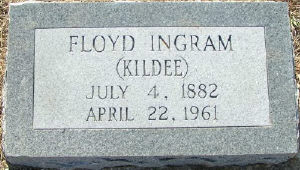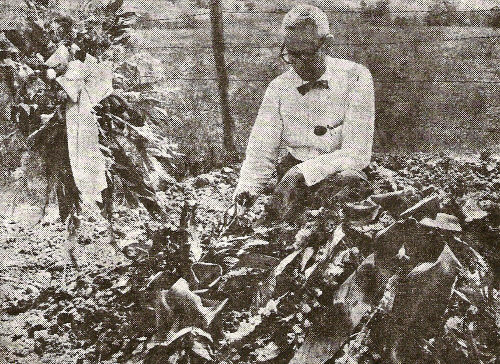| PART OF BLOOMING GROVE Kildee in White Cemetery By Thomas Turner BLOOMING GROVE, Texas - In the white people's cemetery at Blooming Grove a fresh flower bedecked mound is a color-splashed splotch on the black earth. It is the grave of a man as black as a moonless night, whose skin was darker than the blackland. He was part of Blooming Grove in life and remains so in death. "Kildee's" grave is going to be hard for Texas-baiters to explain away. Kildee was 79 when he died last Saturday. It wasn't until then that most people learned he had another name - John Ingram. He had been Kildee since he was a kid probably because of his scrawny frame. He stood well over six feet tall, weighted barley 100 pounds. For 47 years he was a fixture in this little town of 736 people. He left a dollar-a-week job at Teague hotel in 1914 to come to Blooming Grove to pick cotton. A year later he went to work in the bank as custodian. After a few weeks they gave him a key to the bank, something he was long proud of. Up to his death he still had free run of the bank. In 1916 he set up a shoe-shine chair in the barber shop. He worked it until he died. He used to smile that he was on of Blooming Grove's oldest business institutions. He loved this farm community, and it took him to its collective heart. Kildee was a good Methodist Stewart, a PTA enthusiast, a lodge member. Three years ago he ambled into the funeral parlor of Dit McCormick, a lanky ex-county judge and ex-Navy officer. Kildee wanted to make arrangements for his funeral, when the time came. Some how it never occurred to Kildee or his friend Dit there was any race issue involved. It was just two good friends. It stayed that way, after Kildee left a doctor's office in Corsicana entered the car he was riding in, and slumped over dead. They laid him out in McCormick's parlor. More than half the town, which is largely white, came by to pay their respects. They held the funeral in Kildee's square, whitewashed Methodist church. The funeral things were said by two men, the Rev. Z. V. Jones, Kildee's pastor, and Mayor Sam Carroll, his friend. The casket was carried by three Negroes and three whites. Kildee was buried in the newest part of the white cemetery. Two prominent citizens are arranging for a curbing around his grave and a monument. Wasn't there a peep of protest to all of this ? Says McCormick, "Not a word. The only fear was that Kildee might not be buried in our cemetery." Blooming Grove, somewhat surprised at the attention Kildee's burial brought on, is not saying so but it should be pointed out that all this occurred without any soldiers, marshals, or lawyers.
Notes:
ONE EYEBROW RAISED BLOOMING GROVE, Texas - To the residents of this Navarro County town, Kildee's burial just goes to show you can't outguess people. The people involved in seeing that Kildee, a Negro, broke local precedent by being buried in the white folks' cemetery expected (1) some kind of local reaction, not all happy, but (2) little, if any, outside interest. Instead Kildee's final resting place (1) raised only one eyebrow in Blooming Grove, but (2) created quite a stir among outsiders. Kildee was the thin 79-year-old negro who came to Blooming Grove 47 years ago to pick cotton, but wound up one of the town's favorite citizens. As a bank custodian (none of his friends ever though of him as a mere janitor) and the operator of the shine stand in the barber shop of Buster Warren and Loyd Simpson, he was undisputedly the towns best known figure. His funeral was handled by his friend Ditt McCormick, and all the town joined in. Mayor Sam Carroll aided by the Rev. Z. V. Jones in the funeral eulogy, and Kildee's casket was carried gently by three white and three Negroes. After The Dallas News related the story, the post office and phones and highways at Blooming Grove became busy, and have been since. The verdeict has been almost unanimous-Blooming Grove has demonstrated that brotherhood can be more than an orator's gimmick. From Dallas the NAACP wrote Mayor Carroll a logical, restrained, 2-page letter of respect - the kind both sides need more of. At least 20 former residents of Blooming Grove mailed copies of the story back home, and most of them said it made them proud of their old home town. Almost daily some motorist has stopped off to see this little town that made some history with out intending it that way. The letters to undertaker McCormick, a well known ex-county judge, have been a revelation t him. From Holt, Ala., amid a racially troubled state, and old-line white family wrote Dit, "We're glad that Blooming Grove was so good to Kildee." Said an Austin writer, "The world just can't go sour as long as such thoughts are in the minds and hearts of a community." There have been numerous phone calls too to the white people mentioned in connection with the event. The spotlight on Kildee's new grave evoked no protest from the white people who own cemetery lots in the Rose Hill section where he was laid. Warren, Simpson and Drew Gillen head up an unofficial but firm committee which is securing a suitable monument and concrete coping around Kildee. Gillen is a longtime Democrat part wheelhorse for his county, member of a pioneer family whose cemetery lot is 30 feet from Kildee's. Kildee's burial was no isolated one-shot act in Blooming Grove. The R. W. George estate, which donated the land for an addition to the cemetery's Rose Hill section, has come forward with an offer to give another sizable tract adjoining the first one - to be used by other Negro citizens. It would not be factual to say that not a dissenting voice has been raised during all this. One white man did stop Bro Jones, Kildee's Methodist pastor, and inquire if the preacher really believe there will be Negroes in Heaven. When Bro. Jones said solemnly he did, the man said that in that case he wouldn't be interested in going there. Bro. Jones then said equally solemnly, "Well, sir, there'll be a bunch of Negro people in the other place, too."
Notes:
|

